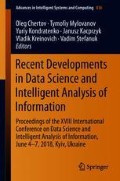Abstract
To provide a more precise meaning to imprecise evaluative linguistic expressions like “probable” or “almost certain”, researchers analyzed how often intelligence predictions hedged by each corresponding evaluative expression turned out to be true. In this paper, we provide a theoretical explanation for the resulting empirical frequencies.
Access this chapter
Tax calculation will be finalised at checkout
Purchases are for personal use only
References
Belohlavek, R., Dauben, J.W., Klir, G.J.: Fuzzy Logic and Mathematics: A Historical Perspective. Oxford University Press, New York (2017)
Central Intelligence Agency, Center for the Study of Intelligence: Sherman Kent and the profession of intelligent analysis, Washington, D.C. (2002)
Fishburn, P.C.: Utility Theory for Decision Making. Wiley, New York (1969)
Fishburn, P.C.: Nonlinear preference and utility theory. The John Hopkins Press, Baltimore (1988)
Kent, S.: Esimates and Influence, Studies in Intelligence. Central Intelligence Agency, Washington, D.C. (1968). https://www.cia.gov/library/center-for-the-study-of-intelligence/csi-publications/books-and-monographs/sherman-kent-and-the-board-of-national-estimates-collected-essays/4estimates.html
Kent, S.: Words of estimative probability, in [19]. https://www.cia.gov/library/center-for-the-study-of-intelligence/csi-publications/books-and-monographs/sherman-kent-and-the-board-of-national-estimates-collected-essays/6words.html
Klir, G., Yuan, B.: Fuzzy Sets and Fuzzy Logic. Prentice Hall, Upper Saddle River (1995)
Luce, R.D., Raiffa, R.: Games and Decisions: Introduction and Critical Survey. Dover, New York (1989)
Mendel, J.M.: Uncertain Rule-based Fuzzy Systems: Introduction and New Directions. Springer, Cham (2017)
Miller, G.A.: The magical number seven, plus or minus two: some limits on our capacity for processing information. Psychol. Rev. 63(2), 81–97 (1956)
Nguyen, H.T., Kosheleva, O., Kreinovich, V.: Decision making beyond Arrow’s “Impossibility Theorem”, with the analysis of effects of collusion and mutual attraction. Int. J. Intell. Syst. 24(1), 27–47 (2009)
Nguyen, H.T., Walker, E.A.: A First Course in Fuzzy Logic. Chapman and Hall/CRC, Boca Raton (2006)
Novák, V.: Evaluative linguistic expressions vs. fuzzy categories? Fuzzy Sets Syst. 281, 81–87 (2015)
Novák, V., Perfilieva, I., Močkoř, J.: Mathematical Principles of Fuzzy Logic. Kluwer, Boston/Dordrecht (1999)
Raiffa, H.: Decision Analysis. Addison-Wesley, Reading (1970)
Rajati M.R., Mendel J.M.: Modeling linguistic probabilities and linguistic quantifiers using interval type-2 fuzzy sets. In: Proceedings of the 2013 Joint World Congress of the International Fuzzy Systems Association and the Annual Conference of the North American Fuzzy Information Processing Society IFSA/NAFIPS 2013, Edmonton, Canada, 24–28 June 2013, pp. 327–332 (2013)
Reed, S.K.: Cognition: Theories and Application. Wadsworth Cengage Learning, Belmont (2010)
Sheskin, D.J.: Handbook of Parametric and Nonparametric Statistical Procedures. Chapman and Hall/CRC, Boca Raton (2011)
Steury, D.P. (ed.): Sharman Kent and the Board of National Estimates. Central Intelligence Agency, Center for the Study of Intelligence, Washington, D.C. (1994)
Tetlock, P.E., Gardner, D.: Superforecasting: The Art and Science of Prediction. Broadway Books, New York (2015)
Zadeh, L.A.: Fuzzy sets. Inf. Control 8, 338–353 (1965)
Acknowledgments
This work was supported in part by the US National Science Foundation grant HRD-1242122.
The authors are greatly thankful to the anonymous referees for their valuable suggestions and to Dan Tavrov for his help.
Author information
Authors and Affiliations
Corresponding author
Editor information
Editors and Affiliations
Rights and permissions
Copyright information
© 2019 Springer Nature Switzerland AG
About this paper
Cite this paper
Kosheleva, O., Kreinovich, V. (2019). How Intelligence Community Interprets Imprecise Evaluative Linguistic Expressions, and How to Justify this Empirical-Based Interpretation. In: Chertov, O., Mylovanov, T., Kondratenko, Y., Kacprzyk, J., Kreinovich, V., Stefanuk, V. (eds) Recent Developments in Data Science and Intelligent Analysis of Information. ICDSIAI 2018. Advances in Intelligent Systems and Computing, vol 836. Springer, Cham. https://doi.org/10.1007/978-3-319-97885-7_9
Download citation
DOI: https://doi.org/10.1007/978-3-319-97885-7_9
Published:
Publisher Name: Springer, Cham
Print ISBN: 978-3-319-97884-0
Online ISBN: 978-3-319-97885-7
eBook Packages: Intelligent Technologies and RoboticsIntelligent Technologies and Robotics (R0)

